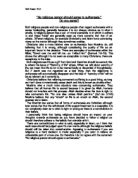eChristians must never support euthanasia.f Do you agree? Give reasons to support your answer and show that you have thought about different points of view.
Alice Roper
c) ‘Christians must never support euthanasia.’ Do you agree? Give reasons to support your answer and show that you have thought about different points of view.
The sanctity of life is a very important concept for Christians. They regard life as a gift from God, and believe that to destroy it contravenes God’s will (Exodus 20:13 features the commandment from God ‘Thou shalt not kill’, which informs this belief). According to the Church of Scotland, ‘Christians believe that our human worth does not depend upon… the quality of life but on our status as being made in God’s likeness’: in other words, life still has value even if the quality of an individual’s life is reduced. The view of the Roman Catholic Church is that euthanasia is a violation of natural law; it ‘represents the rejection of God’s sovereignty over life and death’, and is therefore never acceptable. The idea that it is for God, rather than for human beings, to bring life to a close is therefore central to many Christians’ beliefs, especially Roman Catholics. As Saint Paul put it: ‘None of us lives to himself and none of us dies to himself. If we live to the Lord and if we die, we die to the Lord; so then whether we live or die, we are the Lord’s’. The Parable of the Sheep and the Goats teaches Christians that it is important to look after people whatever their needs. Many Christians believe that this includes caring for the disabled: to terminate a life on the grounds of disability is not acceptable in God’s eyes. It is not for others to judge the quality of another person’s life.







